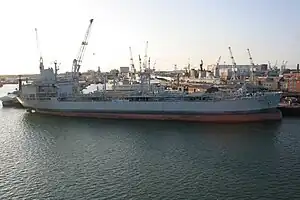 RFA Brambleleaf at Portsmouth Harbour | |
| History | |
|---|---|
| Name | RFA Brambleleaf |
| Ordered | 30 April 1973 |
| Builder | Cammell Laird, Birkenhead |
| Laid down | 23 July 1974 |
| Launched | 22 January 1976 |
| Commissioned | 20 February 1980 |
| Out of service | September 2007 |
| Identification | IMO number: 7342029 |
| Honours and awards | Falklands 1982, Al Faw 2003 |
| Fate | Scrapped August 2009 |
| General characteristics | |
| Class and type | Leaf-class tanker |
| Displacement | 40,870 t (40,225 long tons) full load |
| Length | 170.7 m (560 ft 0 in) |
| Beam | 25.9 m (85 ft 0 in) |
| Draught | 11 m (36 ft 1 in) |
| Propulsion | 2 Crossley-Pielsticks pc 2 v14 on one shaft |
| Speed | 15 knots (28 km/h; 17 mph) |
| Complement | 56 RFA |
RFA Brambleleaf (A81) was a Leaf-class support tanker of the Royal Fleet Auxiliary. Originally built as MV Hudson Deep she was chartered by the Ministry of Defence in 1980.
Operational history
In April 1982, Brambleleaf was diverted from Armilla patrol duties in the Persian Gulf for service during the Falklands Conflict. Due to damage sustained due to severe weather, Brambleleaf transferred her cargo to RFA Tidespring off South Georgia and returned to the UK for repairs during May prior to returning to the South Atlantic in June, and again in August.[1]
On 18 November 1983, Brambleleaf sailed along with the assault ship HMS Fearless to support Operation Offcut, providing naval support for British troops in the multi-national force in Lebanon.[1]
In 2003, Brambleleaf was one of 13 RFA ships deployed in support of the second Gulf War.[1]
References
- 1 2 3 4 "RFA Brambleleaf (3)". historicalrfa.org. Retrieved 22 December 2020.